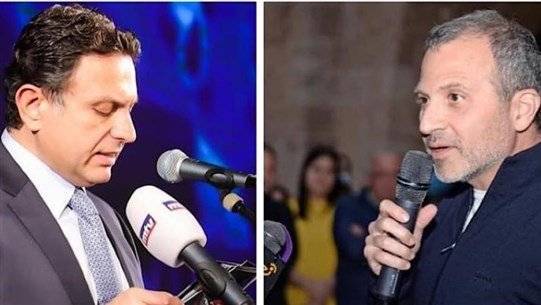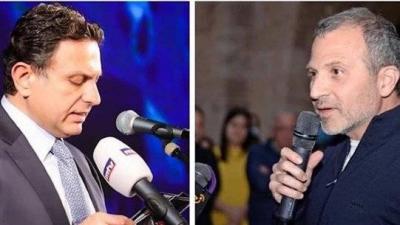In the current presidential election context that the country has entered, any bilateral or collective meeting inevitably takes on presidential dimensions, especially when it involves prominent figures such as the head of the Strong Lebanon Bloc, Deputy Gibran Basil, and Deputy Farid Haykal Khazen, a member of the National Independent Bloc. Much has been said about this meeting, often laden with exaggerated implications and projections. The meeting was initially suggested to occur prior to the parliamentary elections, but it was concluded that it would be better to hold it immediately after the elections to avoid any electoral connotations that were not warranted.
Before any other consideration, the meeting was part of discussions initiated by the Free Patriotic Movement with various parties and political figures, some of which were publicly visible while others remained behind the scenes. Contrary to widespread speculation, the meeting was not related to arranging a bilateral gathering between Basil and the head of the Marada Movement, Sleiman Franjieh. The nature of their relationship, especially following their joint meeting with Hezbollah's Secretary-General, Mr. Hassan Nasrallah, allows for further meetings to take place at any time without the need for mediation and can be agreed upon between the two.
However, this does not negate Khazen's efforts to bridge gaps and play a role in re-establishing his relationship with Basil. Insiders affirm that the meeting ended a period of estrangement between Khazen and the Free Patriotic Movement, without resolving the numerous divergences in viewpoints. Khazen is part of a parliamentary bloc and is a political entity with significance. Both sides acknowledge that the presidential issue was strongly present in their discussions, although that does not imply a focus on any specific point.
Regardless of the outcomes, any meetings and rapprochement are required on the threshold of the presidential elections. Informed sources speak of diligent attempts to eliminate the last obstacles preventing a return to the previously cordial relations between the Free Patriotic Movement and the Marada Movement. Khazen's visit to Laklouk marked the beginning of a series of potentially frequent communications, noting that this visit is a necessity for Khazen to break his isolation in the Kessrouan region. His decision to open lines of communication with the movement is based on the premise that "kohl is better than blindness," given that there are currently no connections between him and the Lebanese Forces.
In the balance of mutual ally Hezbollah, there is a convergence of interests in restoring relations between the Christian allies, the Marada and the Free Patriotic Movement. In this context, the positive verbal signals that Basil has issued to Sleiman Franjieh are notable, especially after their meeting hosted by Hezbollah's Secretary-General. However, this remained within the realm of discussion without translating into reality yet.
Khazen's visit to Basil opens the door to two goals: boosting Khazen's political presence and his role in smoothing tensions between two fundamental Christian components at the threshold of the presidential election, especially given his historically familial relationship with Bkerke. Not long ago, the head of the Marada Movement acted as if he were on the brink of the presidential palace, believing that regional and international atmospheres were in his favor unless any unforeseen events arise, and that Hezbollah would undoubtedly uphold the promises of its Secretary-General.
The presidency, which he tasted for only a few fleeting minutes six years ago, would have implications for his current existence outside it, particularly regarding his relationship with Hezbollah. The Marada Movement is keen on strategically managing its relationship with Basil, anticipating the electoral challenge. Such a relationship would serve as a natural passage to the presidential palace, albeit it is crucial that it rests on solid and clear foundations that do not marginalize any party. This reflects an initial agreement or understanding on the horizons of the forthcoming phase by agreeing on a series of key issues in the country, paving the way to prevent any potential nominations.
Sources monitoring the presidential dossier indicate that Hezbollah is dealing patiently and carefully with this issue and is cautious about asking for something before its time. They are working to reassure Basil, strengthen the alliance with him, and provide guarantees that would secure his political future after President Michel Aoun departs from the Baabda Palace on the thirty-first of October. Hezbollah continues to advise Franjieh against any "unintended misstep" that could result in a return to square one in the relations between the Free Patriotic Movement and the Marada.
Presidentially, there are concerns that a scenario similar to that faced by Mikhael Daher in September 1988 could be repeated in opposition to Franjieh's nomination, notably when Michel Aoun and Samir Geagea came together despite their bloody confrontations to reject Daher’s candidacy, defying the US-Syrian consensus and the warning sent by the US envoy at the time: "Mikhael Daher or chaos." What transpired afterward led to developments culminating in the Taif Agreement.
The card of Army Commander General Joseph Aoun is still on the table, not discarded, awaiting the outcome of US-Iranian relations. Many issues will unfold based on this relationship's results. The pressing question is: Will the presidential election proceed, or will it await a "baptism of fire," bringing forth names not typical to the known circle, leading the next phase, similar to what occurred after the events of 1958, the two-year civil war of 1975-1976, or the "liberation" or "cancellation" wars in 1990, diverging from the type of individual who emerged following the Taif Accord, causing both to veer off course.
As of today, before the end of Michel Aoun's term, Basil has positioned himself as a presidential player. His meeting with Khazen marks the beginning of communications, and more is expected to follow.




